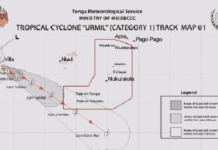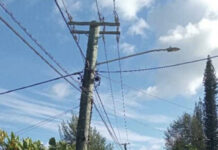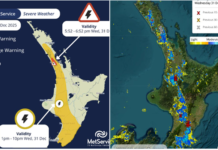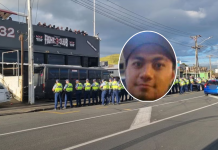
If he had wanted to buy votes he would have ensured they got the money, former Prime Minister Dr. Pohiva Tu’i’onetoa told the Supreme Court.
Defending himself against allegations that TP$50,000 had been offered to a women’s group as a bribe, Dr. Tu’i’onetoa described it as a “misunderstanding.”
The Supreme Court has declared former Prime Minister Dr. Pohiva Tu’i’onetoa’s election to Tongatapu number 10 Electoral District last year void.
Judge N.J.Cooper said Dr. Tu’i’onetoa had committed bribery in breach of Section 1 (a) of the Electoral Act 1989.
Section 21 (1) Electoral Act says that every person commits the offence of bribery who, directly or indirectly, by himself or by any other person on his behalf gives any money or valuable gift to or for any elector, or to or for any other person on behalf of any elector or to or for any other person, in order to induce any elector to vote or refrain from voting.
A reference to giving, lending, agreeing to give or lend, offering, promising or promising to procure or try to procure, any money or valuable gift fell under this category.
A petition was brought to the court by Kelekolio Taniela Kiu, who stood unsuccessfully for the election, challenging the result and alleging that Dr. Tu’i’onetoa committed two acts of bribery.
Kiu sought to have the election declared void.
On October 1, 2021 there was an event at Houmaniutao to showcase the handicrafts of the Women’s Association of Tongatapu 10.
Guests included Dr. Tu’i’onetoa, the then Prime Minister and Minister for Public Enterprises and leader of the Paati ‘a e Kakai; the People’s Party, and also the Minister for Finance, Tevita Lavemaau.
Kiu claimed that TP$50,000 was offered to the Women’s Group of Tongatapu on behalf of Dr. Tu’i’onetoa to influence voters.
Witnesses in support of Kiu said that at the entrance to the Niutao event one of the Prime Minister’s banners was displayed. Political pamphlets were handed out.
The group had previously approached the government for financial help, but been told there was no money, so the announcement of a grant of TP$50,000 by Hon. Lavemaau was greeted with shock.
Some witnesses regarded the event itself as well as the announcement of the money as political campaigning.
They were suspicious that there was in fact no money because there was no systems for grants in place and could take up to a year for applications for grants to be processed and paid.
One of the witnesses, Mele ‘Amanaki, secretary general for the Public Services Association and interim Secretary General of the Seven Sector Association, which represent the interests of groups including fisheries, livestock, handicrafts, tapa making and roadside vendors.
She said the Minister for Finance said the cheque would be sent the following week.
Members of the Handicraft Association had complained to her and she checked the budget. She told them there was nothing there and that the Minister had obviously been lying.
On October 28 Hon. Lavemaau made another speech in which it was stated that conditions had to be met and that the organisation would need aims and a budget and a timeline to fulfil them by.
He said it was not his duty at the Lapaha event to provide all the details, nor was it important for him personally to do so.
He insisted many other groups had received funds, but when asked could not name a single one.
In his defence, the former Prime Minister said he had no idea what the Finance Minister was going to say, so he had no reason to discuss that speech with him. He was being spontaneous and showing his warmth.
He was always under the impression that the women’s group knew how a grant worked. If he wanted to buy their votes he would have insured, they got the money.
Had they approached him directly he would have been aware of any issues; of any misunderstanding. He did not simply let Mr. Lavemaau mislead the people. Silence on his part was not his endorsing what Mr. Lavemaau said.
The money had to come in the form of a grant and he had assumed it had been paid. The first time he suspected that was not so, was when he was served the petition. Then he understood there had been a misunderstanding.
‘Afā wharf
The second case involved the opening of the ‘Afā Wharf
Witnesses who were at the opening of the wharf said they heard the former Prime Minster say he had made the wharf happen and asked the people present to vote for him because of this.
Dr. Tu’i’onetoa agreed he asked for votes at the opening in his speech. The work he did was something the public could trust him about.
Witnesses told the court the ‘Afā wharf had been made a priority by the government. Because of shortages of materials and Covid restrictions, workmen had to labour around the clock to finish the project. The court was told the directions about completing the wharf, including the deadline for completion and opening, came from the Prime Minister’s office.
Work on the project was carried out by the Ports Authority, despite a warning from the Solicitor General that its involvement was unlawful because the Authority had no remit in relation to the outer islands ports.
Judge Cooper found that the offer of TP$50,000 constituted a bribe because it sought to influence a clearly defined group of people. The construction of the wharf benefitted everybody in Tongatapu 10 and beyond and so did not constitute bribery.
“I make a declaration that in accordance with the findings in this judgement Dr. Pohiva Tu’i’onetoa committed bribery on one occasion in breach of section 1 (a) of the Electoral Act 1989,” Judge Cooper said.
“In respect of this, pursuant to section 32 of the Electoral Act 1989 1 make a declaration that the election of Dr. Pohiva Tu’i’onetoa on 18th November 2021 as the People’s Representative for the Tongatapu number 10 Electoral District is void.
“Pursuant to section 37 of the Electoral Act 1989 1 shall forthwith certify this result to the Speaker of the Legislative Assembly.”







